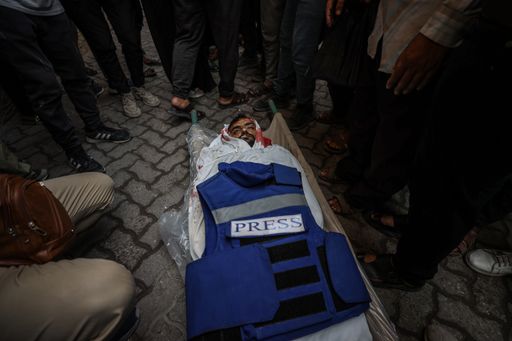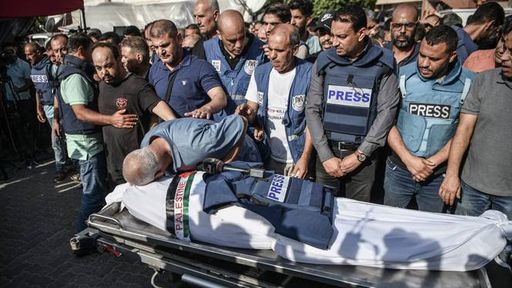“I no longer have the strength to work for the media. My body is too thin. I can’t go on.” — Bashar, AFP photographer in Gaza
In a haunting message posted on Facebook last Saturday, July 19, Bashar, a 30-year-old Palestinian photographer working for Agence France-Presse (AFP), announced what no journalist should ever have to: the slow death of his body — and his profession — due to hunger.
Bashar, who has collaborated with AFP since 2010, first as a fixer and later as a photographer, is one of the last remaining eyes documenting Israeli atrocities in the besieged Gaza.
For over a year, he has endured constant Israeli bombardment, widespread disease, and chronic starvation. Yet, he continued risking his life to document it all. Now, his voice and strength are failing.
“On Sunday (July 20), he told us his brother had ‘fallen,’ a word he used to say he died, because of hunger,” AFP’s internal journalists’ union, the Societe des Journalistes (Society of Journalists), wrote in an emotional public statement issued on July 21.
“We refuse to see them die,” the SDJ declared, issuing an urgent appeal for intervention.
Bashar lives in the ruins of his destroyed family home in Gaza City, alongside his mother, four siblings, and several cousins. Their house has no furniture, no running water, and no food. “Their calls for help, heart-wrenching, have become daily,” the SDJ added.
His story is a chilling reminder that the war in Gaza has crossed yet another grim threshold: the press, which is responsible for reporting the grim reality on the ground, itself is starving.
Bashar is not alone. AFP currently operates in Gaza with ten local freelancers — a single text reporter, three photographers, and six videographers — after evacuating its permanent staff in early 2024.
"Since AFP was founded in August 1944, we have lost journalists in conflicts… but none of us can recall seeing a colleague die of hunger," the SDJ said.
Palestinian artist, poet and activist Lina Abojaradeh sees in this a reflection of a broader, brutal truth. “What Gaza has done is shatter the illusion that we live in a world governed by justice, law, or shared humanity,” she told TRT World.
“The starvation of Gaza is not a failure of the system. It is the system functioning exactly as it's supposed to—to protect the interests of the powerful and leave the oppressed to die unheard.”

Reporting under siege
However, this is not the first time French journalists have sounded the alarm. In an open letter dated May 23, the editorial committees of major French media outlets, including AFP, France 24, RFI, Le Monde, Liberation, and others, called on the French government to urgently evacuate their Palestinian colleagues in Gaza.
The letter highlighted their crucial role in documenting the war from inside the sealed-off territory and warned that many had already faced direct attacks, survived bombings, or were now at risk of starvation. It stressed that without these local journalists, international media would be virtually blind to the unfolding catastrophe in Gaza.
Since the Israeli army barred all international journalists from entering Gaza after October 7, 2023, the burden of telling the story of Gaza has fallen solely on local freelancers like Bashar and others.
AFP evacuated its staff reporters in early 2024, leaving behind a skeleton team, all Gaza residents, living through the same unrelenting trauma they strive to document.
They continue their work in the face of Israeli bombardments, displacement, illness, and now a famine described by doctors as an "epidemic."
Bashar’s days are marked by malnutrition and illness, yet he still tries to document the desperation of others. But even his resilience is fraying.
“For the first time, I feel defeated,” he wrote on Sunday. Later that day, he reportedly said: “I would be grateful if you could explain that we are currently experiencing death by hunger... I wish President Macron would help me out of this hell.”
His plea now echoes beyond Gaza’s sealed borders.

International alarm, but no access
The desperation of Gaza’s remaining reporters has triggered rare diplomatic action.
“I ask that the free and independent press be allowed to access Gaza to show what is happening there and to bear witness,” Barrot said, speaking on France Inter radio from eastern Ukraine.
He added that France was exploring options to help evacuate AFP's freelancers and their families. “We hope to be able to evacuate some collaborators of journalists in the coming weeks,” Barrot said
Meanwhile, over two dozen of Western countries have called for an immediate end to the war in Gaza, saying that suffering there had "reached new depths."
After more than 21 months of fighting that have triggered catastrophic humanitarian conditions for Gaza's more than two million people, Israeli allies Britain, France, Australia, Canada and 21 other countries, plus the EU, said in a joint statement that the war "must end now".
"The suffering of civilians in Gaza has reached new depths," the signatories added, urging a negotiated ceasefire, the release of hostages held by Palestinian resistance fighters and the free flow of much-needed aid.
Yet many Palestinians are sceptical. Abojaradeh, reflecting on the world’s silence as journalists are not only starved but often deliberately targeted, posed a searing question: “If the world didn’t act when journalists were being killed, why would it act now that they’re being starved?”
“We saw Shireen Abu Akleh shot by a sniper on live television, wearing press gear. We’ve seen journalists bombed in their homes, entire media towers destroyed,” she pointed out.

Time is running out
But the SDJ and humanitarian observers warn that time is running out. The situation inside Gaza, especially for reporters, is worsening by the day.
“Most no longer have the physical ability to move around the enclave to do their job,” the SDJ statement reads. “Their cries for help, heartbreaking, have now become daily.”
One such cry comes from Ahlam, a freelance journalist surviving in a makeshift tent in southern Gaza. She says she no longer knows if she’ll return alive each time she leaves to report.
For journalists like Bashar and Ahlam, the line between storyteller and victim has long since vanished.
“We risk learning of their deaths at any moment,” the SDJ concluded in its desperate appeal.



















